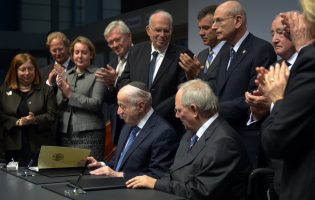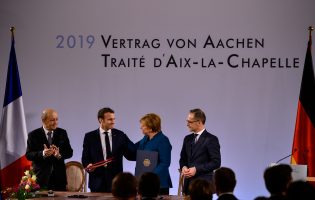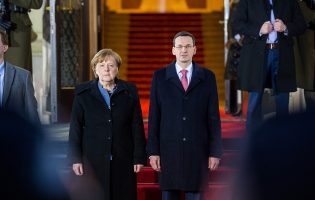
The Afghanistan War: Collective Memory Formation in the United States and Germany
Introduction More than eighteen years have passed since October 2001, when U.S. forces were deployed to Afghanistan after the Taliban regime refused to extradite Osama bin Laden and shut down …

The Afghanistan War: Collective Memory Formation in the United States and Germany
More than eighteen years have passed since October 2001, when U.S. forces were deployed to Afghanistan after the Taliban regime refused to extradite Osama bin Laden and shut down Al-Qaeda …

The Unbroken Past: From Germany to Shanghai to San Francisco
Kurt and Jeannette Nothenberg lived comfortably in the middle class in Germany raising their only child, Rudy. Following Kristallnacht, Kurt was arrested and sent to Buchenwald, but was later released …

The September 1952 Reparations Agreement between West Germany and Israel: The Beginning of a Remarkable Friendship
The thorny issue of reparations for war-time crimes against humanity, material losses, despoliation, and human rights abuses has dominated the political sphere in the last several months. On the international …

Transitional Justice as a Foreign Policy Issue across the Atlantic: Trends and Counter-trends
Transitional justice either describes a socio-political process in transitional societies after conflict or authoritarian rule or a set of measures that should facilitate this process. The process in general and …
Recent Authors
AGI provides knowledge, insights, and networks as tools to solve the challenges ahead.
Support Our Work
Transitional Justice as a Foreign Policy Issue across the Atlantic: Trends and Counter-trends
Transitional justice either describes a socio-political process in transitional societies after conflict or authoritarian rule or a set of measures that should facilitate this process. The process in general and …

Global Transitional Justice
Strategies, Trends, and Counter-Trends across the Atlantic Seeking justice for past atrocities has become a standard practice for countries after conflict or violent rule. These transitional justice processes are often …

From Fear to Friendship: Franco-German Relations in 1949 and 2019
For the last seventy years, the Franco-German “couple” has constituted the center of European integration and peace in Europe. Reflection on the early stage of the relationship and on contemporary …
Mariam Salehi, DAAD/AGI Research Fellow
AGI is pleased to welcome Mariam Salehi as a DAAD/AGI Research Fellow from mid-April to mid-June 2019. Dr. Mariam Salehi is a postdoctoral researcher at the Center for Conflict Studies, …

The Dealer’s Cards: How Gary Sternberg Has Made the Best of Them
Gerd “Gary” Sternberg was dealt a tricky hand. Born the son of a Protestant mother and a Jewish father in Cuxhaven, Germany on August 25, 1931, he experienced discrimination firsthand …
Dr. Lily Gardner Feldman to Retire from AGI
The American-German Institute (AGI) at Johns Hopkins University announces that Dr. Lily Gardner Feldman will be retiring at the end of February 2019. Dr. Gardner Feldman has served as Director …




